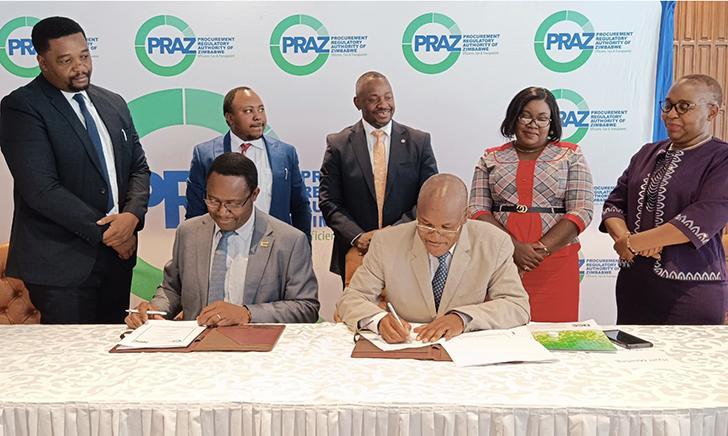News / National
PRAZ, NCC signs a prescriptive pricing diagnosis deal
19 Sep 2024 at 19:46hrs |
0 Views

The Procurement Regulatory Authority of Zimbabwe (PRAZ) and National Competitiveness Commission (NCC) have agreed to create and collaborate in developing a National Market Price List (NMPL) for commonly procured goods and services.
Speaking during the signing ceremony held in Harare this Thursday, PRAZ Chief Executive Officer, Mr Clever Ruswa claimed that this is done in order to assist procuring entities to make procurement decisions that achieve value for money.
"Both Agencies are key in driving the national development agenda. Public procurement can be leveraged on as a strategic socio-economic policy lever," Ruswa added.
The regulatory body claims that this resonates with NCC’s strategic objective of providing evidence-based policy advice and recommendations for creating and maintaining an enabling environment that enhances industry productivity and competitiveness of Zimbabwean goods and services in domestic and global markets.
"As we sign this MOU today, we are doing so to address the gaps of wide price variations commonly procured goods and enhance value for money in accordance with the PPDPA Act and the NCC Act," Ruswa said.
Amongst the objectives of this agreement is to jointly create a comprehensive National Market Price Lists for commonly procured goods and services.
"We aim to produce periodic benchmarking price indexes with a view to give a comparison of prices within the SADC region. We are also there to share information with respect to pricing trends so as to identify cost drivers in order to address current and emerging cost challenges
"We continue to develop recommendations for reviewing relevant regulations to enhance best pricing that achieves value for money To produce periodic benchmarking price indexes.
Through monitoring and evaluation, Ruswa added that they establish mechanisms for the National Market Price List's impact on procurement practices and industry competitiveness.
"This MOA highlights that we will have a joint technical committee and an operational strategy amongst other issues. By achieving these objectives, the MOA aims to strengthen public procurement processes, enhance market competitiveness, and contribute to the overall economic development of Zimbabwe," said Ruswa.
The NCC Executive Director, Philip Phiri has confirmed that the collaboration will go a long way in "Zimbabwe's attainment of an upper middle income economy by 2030".
"This collaboration seeks to achieve fairness and making sure that the standards of living in Zimbabwe are improved. This will also enable us to advise policymakers on issues of competitiveness. This MOU is a symbol of our intention to contribute towards economic growth as NCC," Phiri said.
"Our commitment and partnership to what we are signing today, will inform our policymakers to prioritize these essentials in our quest to ensure price stability of commonly procured goods," Phiri added.
The PRAZ is mandated to regulate public procurement so as to ensure transparency, fairness, honesty, cost-effectiveness and competitiveness in public procurement and disposal of public assets as required by Section 315 of the Zimbabwean Constitution and more specifically by the Public Procurement and Disposal of Public Assets (PPDPA) Act [Chapter 22:23].
Speaking during the signing ceremony held in Harare this Thursday, PRAZ Chief Executive Officer, Mr Clever Ruswa claimed that this is done in order to assist procuring entities to make procurement decisions that achieve value for money.
"Both Agencies are key in driving the national development agenda. Public procurement can be leveraged on as a strategic socio-economic policy lever," Ruswa added.
The regulatory body claims that this resonates with NCC’s strategic objective of providing evidence-based policy advice and recommendations for creating and maintaining an enabling environment that enhances industry productivity and competitiveness of Zimbabwean goods and services in domestic and global markets.
"As we sign this MOU today, we are doing so to address the gaps of wide price variations commonly procured goods and enhance value for money in accordance with the PPDPA Act and the NCC Act," Ruswa said.
Amongst the objectives of this agreement is to jointly create a comprehensive National Market Price Lists for commonly procured goods and services.
"We aim to produce periodic benchmarking price indexes with a view to give a comparison of prices within the SADC region. We are also there to share information with respect to pricing trends so as to identify cost drivers in order to address current and emerging cost challenges
Through monitoring and evaluation, Ruswa added that they establish mechanisms for the National Market Price List's impact on procurement practices and industry competitiveness.
"This MOA highlights that we will have a joint technical committee and an operational strategy amongst other issues. By achieving these objectives, the MOA aims to strengthen public procurement processes, enhance market competitiveness, and contribute to the overall economic development of Zimbabwe," said Ruswa.
The NCC Executive Director, Philip Phiri has confirmed that the collaboration will go a long way in "Zimbabwe's attainment of an upper middle income economy by 2030".
"This collaboration seeks to achieve fairness and making sure that the standards of living in Zimbabwe are improved. This will also enable us to advise policymakers on issues of competitiveness. This MOU is a symbol of our intention to contribute towards economic growth as NCC," Phiri said.
"Our commitment and partnership to what we are signing today, will inform our policymakers to prioritize these essentials in our quest to ensure price stability of commonly procured goods," Phiri added.
The PRAZ is mandated to regulate public procurement so as to ensure transparency, fairness, honesty, cost-effectiveness and competitiveness in public procurement and disposal of public assets as required by Section 315 of the Zimbabwean Constitution and more specifically by the Public Procurement and Disposal of Public Assets (PPDPA) Act [Chapter 22:23].
Source - Byo24News
Join the discussion
Loading comments…












